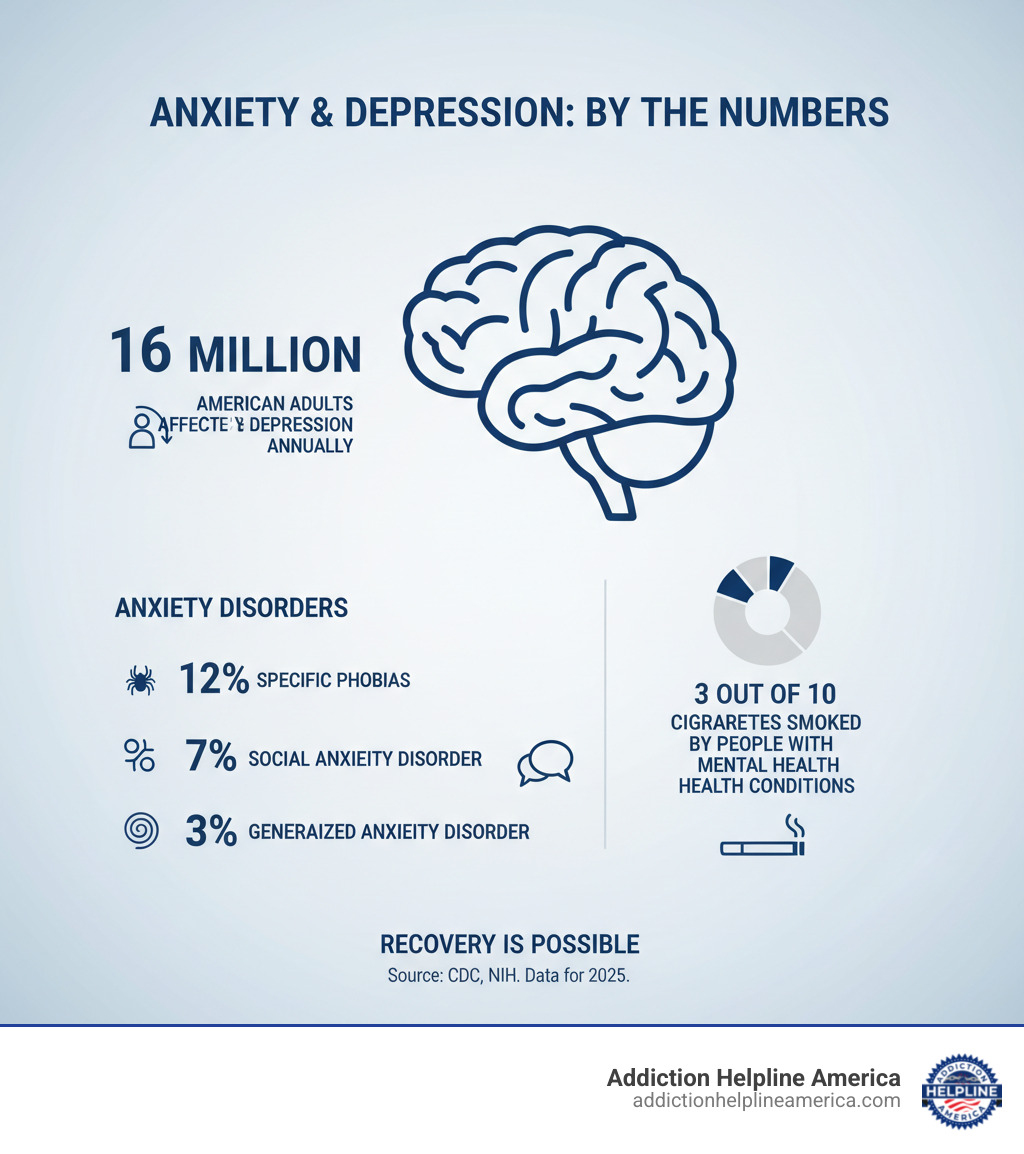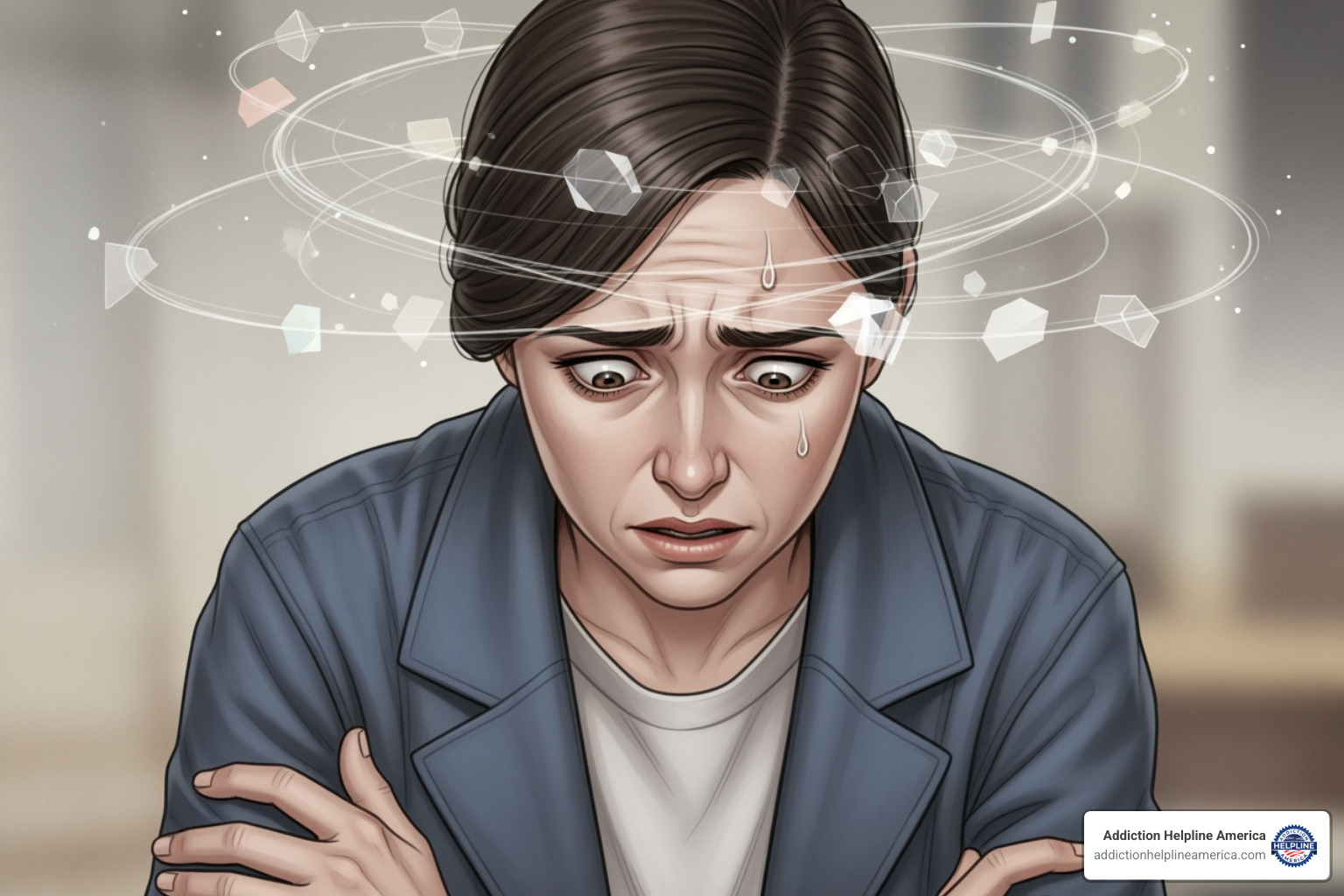
Understanding the Impact of Anxiety and Depression
Interventions for anxiety and depression are evidence-based treatments that can significantly improve quality of life. The most effective interventions include psychotherapy (like CBT), medication, lifestyle changes, and building strong support systems. For severe cases, a combination of therapy and medication is often best.
Anxiety and depression are among the most common mental health conditions in America. Depression affects about 16 million American adults every year, and roughly 1 in 6 adults will experience it in their lifetime. Anxiety disorders are even more widespread, with specific phobias affecting up to 12% of the U.S. population and social anxiety disorder affecting about 7%.
These conditions often occur together, but the good news is that recovery is possible with the right treatment. This guide breaks down science-backed interventions, from professional treatments to lifestyle changes, to help you understand your options and build a path to lasting recovery.
At Addiction Helpline America, we help individuals and families steer recovery from co-occurring mental health and substance use challenges. Our team connects people with evidence-based treatment options 24/7, providing the guidance needed to take the first step toward healing.
Interventions for anxiety and depression helpful reading:
Understanding Anxiety and Depression
Anxiety and depression are medical conditions that can make daily tasks feel overwhelming. Understanding the symptoms, causes, and diagnostic process is the first step toward finding the right interventions for anxiety and depression that work for you.
The Dual Challenge: Symptoms and Co-occurrence
Anxiety and depression often appear together. Understanding both is essential for effective treatment.
Depression is a persistent condition affecting how you think, feel, and function. Symptoms include:
- Persistent sadness, anxiety, or emotional numbness
- Loss of interest in activities once enjoyed
- Changes in sleep (insomnia or oversleeping) and appetite
- Unexplained physical aches and pains
- Difficulty concentrating, making decisions, or remembering
- Feelings of worthlessness, guilt, or irritability
- In severe cases, thoughts of death or self-harm
Anxiety keeps the mind and body on high alert. Symptoms include:
- Persistent, uncontrollable worry
- Physical symptoms like a pounding heart, sweating, trembling, or stomach issues
- Restlessness or feeling on edge
- Muscle tension and difficulty sleeping
- Avoidance of situations that trigger symptoms
Sleep problems, difficulty concentrating, and irritability are common to both, which can make diagnosis tricky. The two conditions often fuel each other in a vicious cycle: constant anxiety can lead to exhaustion and depression, while the hopelessness of depression can cause anxiety. Research shows that anxiety disorders frequently co-occur with depression, requiring interventions that address both.
Unpacking the Causes and Risk Factors
Anxiety and depression arise from a complex mix of factors:
- Genetics: A family history of these conditions increases your risk, but it doesn’t determine your destiny.
- Brain Chemistry: Imbalances in neurotransmitters like serotonin and dopamine can affect mood and stress responses.
- Life Events: Major stressors like loss, divorce, or trauma can trigger symptoms.
- Chronic Stress: Constant stress can alter brain chemistry over time, increasing vulnerability.
- Medical Conditions: Thyroid problems, heart disease, and chronic pain can cause or mimic symptoms of depression and anxiety.
- Substance Use: Alcohol and drugs may offer temporary relief but worsen symptoms over time and can lead to dependence.
Getting a Diagnosis: The First Step to Recovery
An accurate diagnosis is an empowering step toward getting the right help.
- Physical Exam: A doctor will first rule out physical health issues like thyroid problems or vitamin deficiencies that could be causing your symptoms.
- Psychological Evaluation: A mental health professional (psychologist, psychiatrist, or counselor) will conduct a thorough assessment, asking about your thoughts, feelings, behaviors, and personal history.
- Diagnostic Criteria: Professionals use the Diagnostic and Statistical Manual of Mental Disorders (DSM-5) to ensure an accurate and consistent diagnosis.
Being completely honest with your provider is essential for an effective treatment plan. Understanding the specific type of anxiety disorder—such as Generalized Anxiety Disorder (GAD), Panic Disorder, Social Anxiety Disorder, or Specific Phobias—helps tailor the most effective interventions for anxiety and depression.
Professional Interventions for Anxiety and Depression
Once diagnosed, a range of effective professional interventions for anxiety and depression becomes available, personalized to your unique needs.
Psychotherapy: The Gold Standard for Long-Term Relief
Psychotherapy, or “talk therapy,” teaches you lifelong skills for understanding yourself and managing your mental health. Research shows therapy often outperforms medication for long-term management of anxiety because it equips you with coping strategies, problem-solving abilities, and a safe space to process triggers and past trauma.
Finding the right therapist is key. Ask your doctor for referrals to professionals specializing in evidence-based treatments for anxiety and depression. A strong therapeutic relationship is crucial for success.
- The empirical status of cognitive-behavioral therapy is well-documented, showing its high effectiveness.
- Interpersonal Therapy (IPT) is another approach that focuses on improving relationships and social functioning to alleviate depression.
The Role of Cognitive Behavioral Therapy (CBT)
CBT is the most proven psychotherapy for both anxiety and depression. Its core principle is that our thoughts, feelings, and behaviors are interconnected. By changing one, you can influence the others.
In CBT, you will learn to:
- Identify and challenge negative thought patterns: Catch automatic, distorted thoughts and evaluate them with evidence.
- Develop balanced perspectives: Use rational self-talk and reality testing to reframe your thinking.
- Engage in behavioral activation: For depression, this involves systematically reintroducing pleasurable and meaningful activities to break the cycle of withdrawal.
- Build a skill toolkit: Learn problem-solving and stress management techniques.
Exposure therapy, a key component of CBT for anxiety disorders, involves gradual, controlled exposure to feared situations to retrain the brain’s fear response. This is highly effective for phobias, panic disorder, and PTSD.
Medication: Benefits, Risks, and Considerations
Medication is another vital intervention, especially for moderate to severe symptoms, and is often most effective when combined with psychotherapy.
- How it Works: Medication alters brain chemistry to relieve symptoms, often working faster than therapy alone (full effects in 4-6 weeks). However, symptoms may return if medication is stopped, whereas therapy provides lasting skills.
- Antidepressants: SSRIs (e.g., Prozac, Zoloft) and SNRIs (e.g., Effexor XR) are commonly prescribed for both anxiety and depression. They take several weeks to work fully.
- Anti-anxiety Medications: Benzodiazepines (e.g., Xanax, Klonopin) offer rapid relief for panic but are habit-forming and not recommended for long-term use. Buspirone is a non-addictive alternative for generalized anxiety.
- Beta-blockers: Medications like propranolol can manage the physical symptoms of anxiety (racing heart, trembling) and are useful for performance anxiety.
Important Considerations: Antidepressants can have side effects like nausea or weight changes and carry a black box warning for increased suicide risk in people under 25. Never stop medication abruptly without consulting your doctor, as this can cause withdrawal symptoms. If one medication doesn’t work, your doctor can help you find a better alternative.
At Addiction Helpline America, we connect you with professionals who can provide comprehensive care, ensuring your medication plan is safe and effective for your complete health picture.
Lifestyle Changes and Daily Coping Strategies
Professional treatments work best when combined with positive lifestyle changes and daily coping strategies. These habits build a strong foundation for your recovery.
Powerful Lifestyle Interventions for Anxiety and Depression
- Exercise: Regular physical activity releases endorphins, burns off stress chemicals, and improves sleep. Even moderate activity like walking 3-4 times a week makes a difference.
- Nutrition: A balanced diet rich in vegetables, fruits, and whole grains provides essential nutrients for brain health. Avoid excessive sugar and processed foods.
- Sleep: Aim for 7-9 hours of quality sleep per night. A consistent sleep schedule and a calming bedtime routine are crucial for mental health.
- Stress Management: Techniques like meditation, mindfulness, and yoga help you focus on the present and manage stress. Breathing exercises can quickly calm your nervous system.
Daily Coping Skills and Self-Help Techniques
- Grounding: Use the 5-4-3-2-1 technique to anchor yourself in the present moment during overwhelming anxiety. Identify 5 things you see, 4 you feel, 3 you hear, 2 you smell, and 1 you taste.
- Journaling: Write down your thoughts and feelings to identify triggers and patterns.
- Structured Problem-Solving: Break down overwhelming worries into concrete, manageable action steps.
- Time Management: Prioritize tasks and break large projects into smaller goals to reduce stress.
- Assertiveness Training: Learn to communicate your needs and set boundaries to reduce feelings of powerlessness.
The Link Between Smoking, Caffeine, and Mental Health
- Nicotine: Though it may feel calming, nicotine is a stimulant that worsens anxiety. People with mental health conditions smoke at higher rates, but quitting can improve mental health outcomes.
- Caffeine: As another stimulant, caffeine can intensify physical anxiety symptoms like a racing heart and jitters. Reducing or eliminating it can help.
- Alcohol and Drugs: Self-medicating with substances disrupts brain chemistry, worsens mood, and can lead to addiction, complicating recovery.
Alternative Medicine and Herbal Remedies
While some people explore natural options, it’s crucial to proceed with caution.
- St. John’s Wort for depression can interact dangerously with many prescription medications.
- Omega-3 fatty acids have shown some promise for mood stabilization and are generally safe.
- Kava for anxiety carries a risk of severe liver damage and is not recommended.
Crucial Warning: The FDA does not regulate herbal supplements for safety or purity. Always talk to your doctor before starting any supplement or alternative treatment. Natural does not automatically mean safe, and your provider can help you avoid dangerous interactions.
Building Your Support System and Finding Help
Recovery from anxiety and depression is not a solo journey. Connecting with others is one of the most powerful interventions for anxiety and depression you can have.
How to Prepare for a Doctor’s Appointment
Preparation can help you feel more confident and get the most out of your appointment. Before you go, be ready to discuss:
- Your symptoms: When did they start? How do they affect your daily life (work, sleep, relationships)?
- Your triggers: What situations, thoughts, or events seem to make your symptoms worse?
- Your family history: Have any relatives dealt with mental health or substance use issues?
- Your medication list: Include all prescriptions, over-the-counter drugs, vitamins, and supplements.
- Your questions: Write down questions to ask your doctor, such as treatment options, side effects, and what to do in a crisis.
Support Systems for Individuals and Families
Isolation feeds anxiety and depression, while connection heals. Building a support system is essential.
- Family and Friends: Honest conversations with loved ones can create a foundation of emotional and practical support.
- Support Groups: Organizations like the National Alliance on Mental Illness (NAMI) and the Anxiety and Depression Association of America (ADAA) offer groups where you can connect with others who have similar experiences.
- Peer Support: Connecting with people who have lived experience with mental health recovery can provide unique hope and practical advice.
If you are supporting a loved one, listen without judgment, educate yourself about their condition, and encourage them to stick with professional treatment. Your patient support is a lifeline.
What to Do in a Mental Health Crisis
Knowing where to get immediate help during a crisis can save a life. A crisis may involve severe emotional distress, an inability to cope, or thoughts of harming yourself or others.
Suicidal thoughts are a medical emergency. If you or someone you know is having them, act immediately.
Immediate Help Resources (Available 24/7):
- Call or Text 988: The National Suicide Prevention Lifeline connects you with trained counselors.
- Call 911 or go to the nearest emergency room if there is immediate physical danger.
- Contact your mental health provider or a trusted friend or family member.
At Addiction Helpline America, our 24/7 team can connect you with crisis resources and treatment options. Reaching out is the bravest step you can take.
Frequently Asked Questions about Interventions for Anxiety and Depression
What is the most effective first-line intervention for anxiety and depression?
For moderate to severe symptoms, the most effective approach is often a combination of psychotherapy and medication. Cognitive Behavioral Therapy (CBT) is the gold standard in therapy, as it teaches practical skills to change negative thought patterns and behaviors. When paired with antidepressants like SSRIs or SNRIs, this dual approach addresses both psychological and biological factors, often leading to the best outcomes.
How long does it take for interventions to start working?
Timelines vary. Medication like antidepressants typically takes 2 to 4 weeks to show noticeable improvement, with full benefits appearing around 6 to 8 weeks. Psychotherapy can provide helpful coping skills within the first few sessions, but deeper, lasting change in thought patterns and behaviors often takes several weeks to months of consistent work. The skills learned in therapy, however, provide lifelong benefits.
What are the long-term consequences of untreated anxiety and depression?
Leaving anxiety and depression untreated can have serious consequences. Conditions often worsen, impacting daily functioning, work, and relationships. Many people turn to alcohol or drugs to self-medicate, leading to substance use disorders that complicate recovery. Physically, chronic anxiety and depression can increase the risk of heart problems and weaken the immune system. Most critically, untreated conditions significantly increase the risk of suicidal thoughts and behaviors. These outcomes are preventable with proper treatment, which is why seeking help is so important.
Take the First Step Towards Healing
If you’re reading this, you’ve already taken a crucial step: seeking information and considering change. We’ve covered many interventions for anxiety and depression, from therapy and medication to lifestyle changes and support systems.
Recovery is a journey, not a destination. Progress isn’t always linear, and there is no one-size-fits-all solution. Finding the right combination of treatments will involve working with professionals, patience, and self-compassion. The most important thing you can do right now is reach out for help.
At Addiction Helpline America, we’ve helped thousands of people who felt uncertain but were ready for a change. We understand that anxiety and depression often co-occur with substance use challenges, and we’re here to help with the whole picture.
We provide free, confidential, and personalized guidance 24/7. Our team connects you with trusted treatment centers across all 50 states and the District of Columbia, helping you find a program custom to your unique needs.
You deserve to feel hopeful, experience joy, and be yourself again. Recovery is possible, and it starts with a single step.
Our helpline is 100%
free & confidential
If you or someone you care about is struggling with drug or alcohol addiction, we can help you explore your recovery options. Don’t face this challenge alone—seek support from us.
Programs
Resources
Will my insurance
cover addiction
treatment?
We're ready to help
Find the best
drug or alcohol treatment
center
Are you or a loved one struggling with addiction? Call today to speak to a treatment expert.






